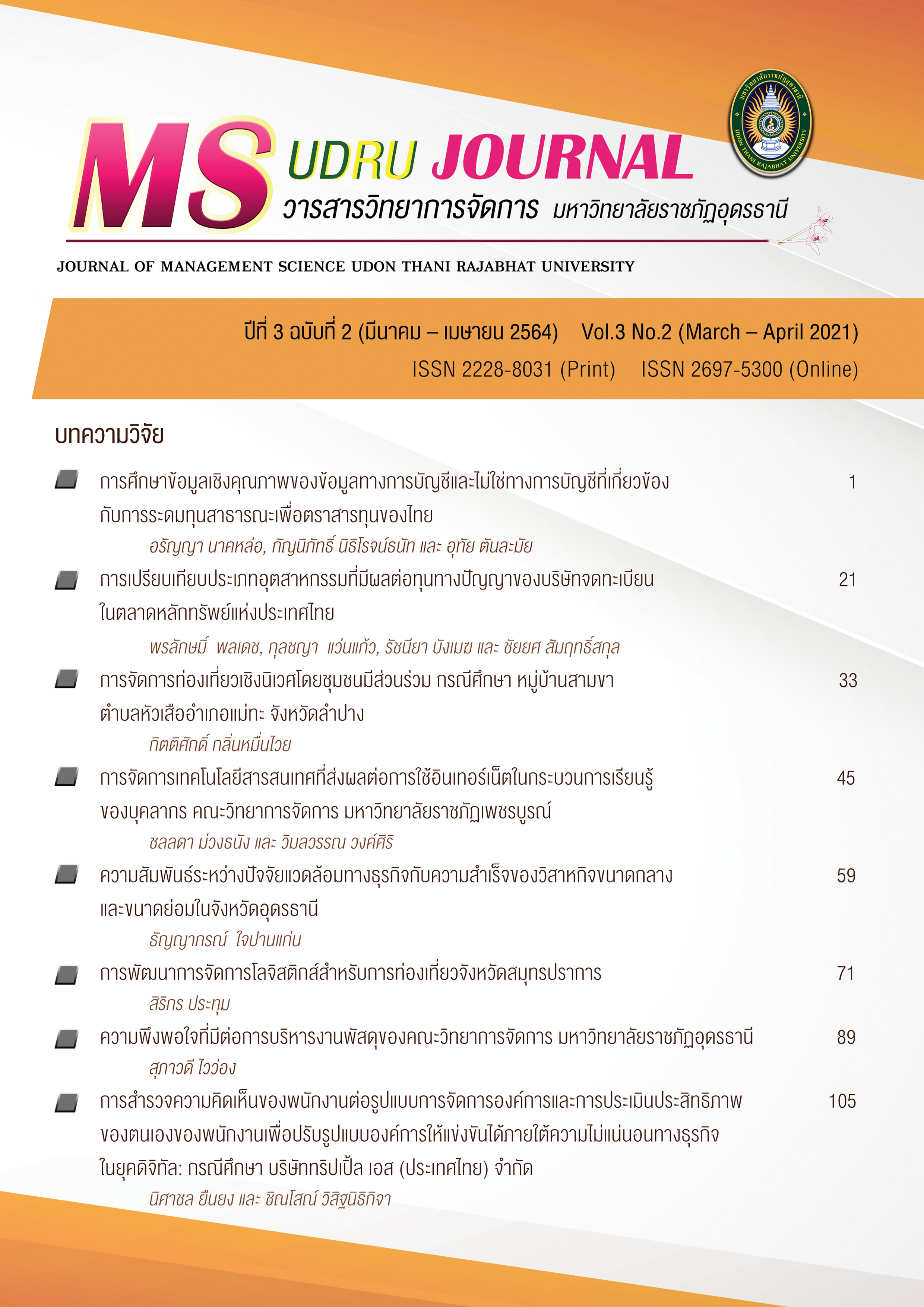การจัดการเทคโนโลยีสารสนเทศที่ส่งผลต่อการใช้อินเทอร์เน็ตในกระบวนการเรียนรู้ของบุคลากร คณะวิทยาการจัดการ มหาวิทยาลัยราชภัฏเพชรบูรณ์
Main Article Content
บทคัดย่อ
การวิจัยนี้มีวัตถุประสงค์เพื่อ 1) ศึกษาระดับของการใช้อินเทอร์เน็ตเกี่ยวกับกระบวนการเรียนรู้ของบุคลากร 2) ศึกษาการจัดการเทคโนโลยีสารสนเทศที่ส่งผลต่อการใช้อินเทอร์เน็ตเกี่ยวกับกระบวนการเรียนรู้ของบุคลากร และ 3) ศึกษาความสัมพันธ์ระหว่างการจัดการเทคโนโลยีสารสนเทศกับการใช้อินเทอร์เน็ตเกี่ยวกับกระบวนการเรียนรู้ของบุคลากร กลุ่มตัวอย่างคือบุคลากรสายวิชาการในคณะวิทยาการจัดการ มหาวิทยาลัยราชภัฏเพชรบูรณ์ จำนวน 53 คน เครื่องมือที่ใช้ในการวิจัย คือ แบบสอบถาม สถิติที่ใช้ในการวิเคราะห์ข้อมูลคือ ค่าร้อยละ (Percent) ค่าเฉลี่ย (Mean) ส่วนเบี่ยงเบนมาตรฐาน (Standard Deviation) และการวิเคราะห์การถดถอยเชิงเส้นพหุคูณ (Multiple Liner Regression) ผลการวิจัยพบว่า 1. การจัดการเทคโนโลยีสารสนเทศของคณะ ความพึงพอใจโดยภาพรวม อยู่ในระดับมาก มีค่าเฉลี่ยเท่ากับ 3.94 ด้านการส่งเสริมการใช้เทคโนโลยีสารสนเทศ อยู่ในระดับมากที่สุด และการใช้อินเทอร์เน็ตเกี่ยวกับกระบวนการเรียนรู้ของบุคลากร โดยภาพรวม อยู่ในระดับมาก มีค่าเฉลี่ยเท่ากับ 4.19 ด้านการใช้บริการเวิลด์ไวด์เว็บ อยู่ในระดับมากที่สุด 2. ระดับของการใช้อินเทอร์เน็ตเกี่ยวกับกระบวนการเรียนรู้ของบุคลากร มีการใช้อินเทอร์เน็ตมากกว่า 3 ครั้งต่อวัน คิดเป็นร้อยละ 83.02 ระยะเวลาในการใช้อินเทอร์เน็ตมากกว่า 2 ชั่วโมงต่อครั้ง คิดเป็นร้อยละ 71.70 และใช้อินเทอร์เน็ตในช่วงเวลา 12.01–18.00 น. คิดเป็นร้อยละ 60.38 3. การจัดการเทคโนโลยีสารสนเทศส่งผลต่อการใช้อินเทอร์เน็ตในการจัดกระบวนการเรียนรู้ของบุคลากร อย่างมีนัยสำคัญที่ระดับนัยสำคัญทางสถิติ 0.01 ด้านการส่งเสริมการใช้เทคโนโลยีสารสนเทศ โดยมีประสิทธิภาพในการทำนายสูงสุด ร้อยละ 66.75 4. การจัดการเทคโนโลยีสารสนเทศมีความสัมพันธ์กับการใช้อินเทอร์เน็ตในการจัดกระบวน การเรียนรู้ของบุคลากร อย่างมีนัยสำคัญที่ระดับนัยสำคัญทางสถิติ 0.01 ใน 3 ประเด็น คือ การใช้บริการเวิลด์ไวด์เว็บ การใช้บริการไปรษณีย์อิเล็กทรอนิกส์ และการใช้บริการถ่ายโอนแฟ้มข้อมูล
Article Details

อนุญาตภายใต้เงื่อนไข Creative Commons Attribution-NonCommercial-NoDerivatives 4.0 International License.
บทความที่ได้รับการตีพิมพ์เป็นลิขสิทธิ์ของคณะวิทยาการจัดการ มหาวิทยาลัยราชภัฏอุดรธานี
ข้อความที่ปรากฏในบทความแต่ละเรื่องในวารสารวิชาการเล่มนี้
ไม่ใช่ความคิดเห็นและความรับผิดชอบของผู้จัดทำ บรรณาธิการ กองบรรณาธิการ และคณะวิทยาการจัดการ มหาวิทยาลัยราชภัฏอุดรธานี ความรับผิดชอบด้านเนื้อหาและการตรวจร่างบทความแต่ละเรื่องเป็นความคิดเห็นของผู้เขียนบทความแต่ละท่าน
เอกสารอ้างอิง
เคอบาลิจา, โจวาน. (2558). เปิดประตูสู่การอภิบาลอินเทอร์เน็ต. (พิภพ อุดมอิทธิพงศ์, ผู้แปล). กรุงเทพฯ: มูลนิธิเพื่ออินเทอร์เน็ตและวัฒนธรรมพลเมือง.
จอมพล เล้ารุ่งเรือง. (2561). พฤติกรรมการใช้อินเทอร์เน็ตและผลสัมฤทธิ์ทางการเรียน กรณีศึกษา: นักศึกษามหาวิทยาลัยเทคโนโลยีราชมงคลพระนคร. วิทยานิพนธ์วิทยาศาสตรมหาบัณฑิต สาขาวิชานโยบายและการบริหารเทคโนโลยีสารสนเทศ วิทยาลัยนวัตกรรม มหาวิทยาลัยธรรมศาสตร์.
ธานินทร์ ศิลป์จารุ. (2555). การวิจัยและวิเคราะห์ข้อมูลทางสถิติด้วย SPSS และ AMOS. กรุงเทพฯ: ห้างหุ้นส่วนสามัญบิสซิเนสอาร์แอนด์ดี.
นิรุวรรณ เทิรนโบล์ สุรศักดิ์ เทียบฤทธิ์ และสุภาวดี บุดดาหวัง. (2561). ปัจจัยด้านพฤติกรรมการใช้อินเทอร์เน็ตที่ส่งผลต่อความสัมพันธ์ในครอบครัวของนักเรียนขั้นมัธยมศึกษาตอนต้น ในโรงเรียนเขตอำเภอเมืองมหาสารคาม จังหวัดมหาสารคาม. วารสารทันตาภิบาล, 2(29), 27- 37.
พิชิต ฤทธิจรูญ. (2557). เทคนิคการประเมินโครงการ. กรุงเทพฯ: ศูนย์หนังสือจุฬาลงกรณ์มหาวิทยาลัย.
ไพศาล วรคำ. (2559). การวิจัยทางการศึกษา (Vol. 8). มหาสารคาม: ตักสิลาการพิมพ์.
ล้วน สายยศ และ อังคณา สายยศ. (2543). การวัดด้านจิตพิสัย. กรุงเทพฯ: สุริยาสาส์น.
ศศลักษณ์ ทองขาว. (2558). คอมพิวเตอร์และเทคโนโลยีสารสนเทศสมัยใหม่. กรุงเทพฯ: แมคกรอฮิล อินเตอร์เนชั่นแนล เอ็นเตอร์ไพรส์ แอลแอลซี.
ศิริวัฒน์ เปลี่ยนบางยาง. (2558). ประสิทธิผลของการใช้เทคโนโลยีสารสนเทศในการปฏิบัติงานของเจ้าหน้าที่องค์กรปกครองส่วนท้องถิ่น. Veridian E-Journal, 3(8), 1051 - 1062.
สมคิด บางโม. (2562). องค์การและการจัดการ. กรุงเทพฯ: ซีเอ็ดยูเคชั่น.
สุทิน ชนะบุญ. (2560). สถิติและการวิเคราะห์ข้อมูลในงานวิจัยเบื้องต้น. ขอนแก่น: สำนักงานสาธารณสุขจังหวัดขอนแก่น.
สุนีย์ มัลลิกะมาลย์. (2560). วิธีวิทยาการวิจัยทางนิติศาสตร์และสังคมศาสตร์. กรุงเทพฯ: อาร์ทิพาเนีย.
Rovinelli RJ, and Hambleton RK. (1997). On the use of content specialists in the assessment of criterion-referwnced test item validity. Dutch Journal of Educational Research, 2, 49 - 60.
Stufflebeam DL, and Shinkfield AJ. (2007). Evaluation theory, Models, and application. San Francisco: Jossey - Bass.


